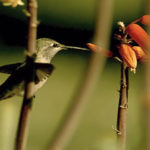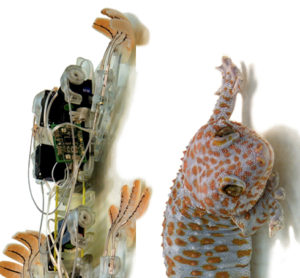News, Stanford engineer helps crack mystery of bird flight
It has taken more than a million fine samples of aerodynamic force and airflow combined to determine what makes a hummingbird’s wings so adept at hovering. The team led by David Lentink, an assistant professor of mechanical engineering at Stanford, believes that the results could have significant impacts in both aerodynamic research and in advancing bio-inspired designs of drones and other aircraft. The research centers on an investigation of wing aspect ratios – the ratio of the wing’s length to its breadth, or chord. Most airplanes and helicopters have wings or blades with high aspect ratios – that is, they tend to be long and slender. This high aspect ratio performs exceptionally well at low angles of attack, when the wings are more or less parallel with the ground, and especially when they rotate or glide. At more aggressive angles, however, the airflow over the wing becomes unstable and separates from the surface and flight can stall. Most flying animals, including the hummingbird, have wings with remarkably low aspect ratios, short and stubby. “Scientists have long observed how these animals’ wings allow them to hover or fly very slowly, and even avoid stalling when beating at a steep angle of attack, but how they manage to do so has remained a complicated mystery,” Lentink said. To unravel this physics problem, Lentink and his colleagues mounted wings from museum specimens of Anna’s hummingbirds to a spinning device, and monitored how air flowed around the wing as it beat in a pattern that mimicked hovering. They found that the leading edge of the wing created a stable tornado-like vortex in the air, similar to those previously observed by other scientists studying live hovering hummingbirds.
Related posts:
Learn about our two Decals!
 Click here to find out more about our Fall Bioinspired Design Decal and our Spring Bioinspired Design in Action Decal – ALL MAJORS are welcome.
Click here to find out more about our Fall Bioinspired Design Decal and our Spring Bioinspired Design in Action Decal – ALL MAJORS are welcome.Berkeley BioDesign Community
 Click here to learn about the BioD: Bio-Inspired Design @ Berkeley student organization or here to signup for more info.
Click here to learn about the BioD: Bio-Inspired Design @ Berkeley student organization or here to signup for more info.Search
Student Login




I imagine that the neurological circuits underlying these processes are governed by both 2d spacing maps with their brains as…
to reduce the impact of car accidents, it may be possible to study the force diverting physics of cockroaches to…
you see this type of head-bobbing stability in many avian creatures related to pigeons like chickens. the head ability to…
not like they taught horses how to run! this is an example of convergent evolution where both sea creatures and…
The brain functions in a similar way with neuronal connections. our brains are able to utilize the multiplicity of connections…